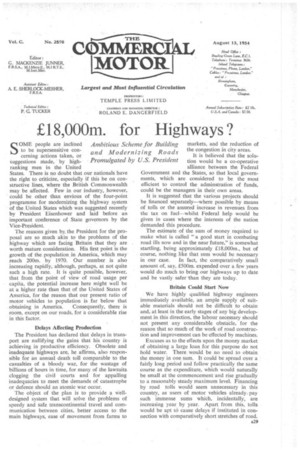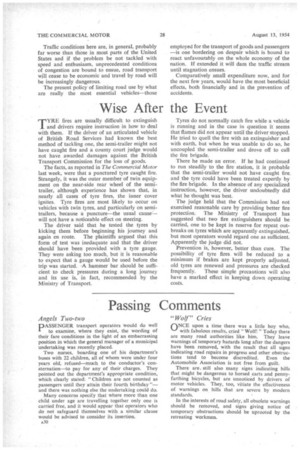£18,000m. for Highways?
Page 31

Page 32

If you've noticed an error in this article please click here to report it so we can fix it.
Ambitious Scheme for Building and Modernizing Roads Promulgated by U.S. President
SOME people are inclined to be supersensitive concerning actions taken, or suggestions made, by highranking men in the United States. There is no doubt that our nationals have the right to criticize, especially if this be on constructive lines, where the British Commonwealth may be affected. Few in our industry, however, could be other than envious of the four-point programme for modernizing the highway system of the .United States which was suggested recently by President Eisenhower and laid before an important conference of State governors by the Vice-President.
The reasons given by the President for the proposal are so much akin to the problems of the highway which are facing Britain that they are worth mature consideration. His first point is the growth of the population in America, which may reach 200m. by 1970. Our number is also increasing rapidly, although, perhaps, at not quite such a high rate. It is quite possible, however, that from the point of view of road usage per capita, the potential increase here might well be at a higher rate than that of the United States of America, for the reason that our present ratio of motor vehicles to population is far below that . obtaining in America. Consequently, there is room, except on our roads, for a considerable rise in this factor.
Delays Affecting Production The President has declared that delays in transport are nullifying the gains that his country is achieving in productive efficiency. Obsolete and inadequate highways are, he affirms, also responsible for an annual death toll comparable to the casualties of a bloody war, for the wastage of billions of hours in time, for many of the lawsuits clogging the civil courts and for appalling inadequacies to meet the demands of catastrophe or defence should an atomic war occur.
The object of the plan is to provide a welldesigned system that will solve the problems of speedy and safe transcontinental travel and communication between cities, better access to the main highways, ease of movement from farms to markets, and the reduction of the congestion in city areas.
It is believed that the solution would be a co-operative alliance between the Federal Government and the States, so that local governments, which are considered to be the most efficient to control the adminstration of funds, could be the managers in their, own areas.
It is suggested that the various projects should be financed separately—where possible by means of tolls or the assured increase in revenues from the tax on fuel—whilst Federal help would be given in cases where the interests of the nation demanded this procedure.
The estimate of the sum of money required to make what is called "a good start in combating road ills now and in the near future," is somewhat startling, being approximately £18,000m., but of course, nothing like that sum would be necessary in our case. In fact, the comparatively small amount of, say, £500m. expended over a few years would do much to bring our highways up to date and be vastly safer 'than they are today.
Britain Could Start Now We have highly qualified highway engineers immediately available, an ample supply of suitable materials should not be difficult to obtain and, at least in the early stages of any big development in this direction, the labour, necessary should not present any considerable obstacle, for the reason that so much of the work of road construction and improvement can be effected by machines.
Excuses as to the effects upon the money market of obtaining a large loan for this purpose do not hold water. There would be no need to obtain the money in one sum. It could be spread over a fairly long period and follow practically the same course as the expenditure, which would naturally be small at the commencement and rise gradually to a reasonably steady maximum level. Financing by road tolls would seem unnecessary in this country, as users of motor vehicles already, pay such immense sums which, incidentally, are increasing year by year. Apart from this, tolls would be apt tO cause delays if instituted in connection with comparatively short stretches of road. Traffic conditions here are, in general, probably far worse than those in most parts of the United States and if the problem be not tackled with speed and enthusiasm, unprecedented conditions of congestion are bound to ensue, road transport will cease to be economic and travel by road will be increasingly dangerous.
The present policy of limiting road use by what are really the most essential vehicles—those employed for the transport of goods and passengers —is one bordering on despair which is bound to react unfavourably on the whole economy of the nation. If extended it will darn the traffic stream until stagnation ensues.
Comparatively small expenditure now, and for the next few years, would have the most beneficial effects, both financially and in the prevention of accidents.




























































































